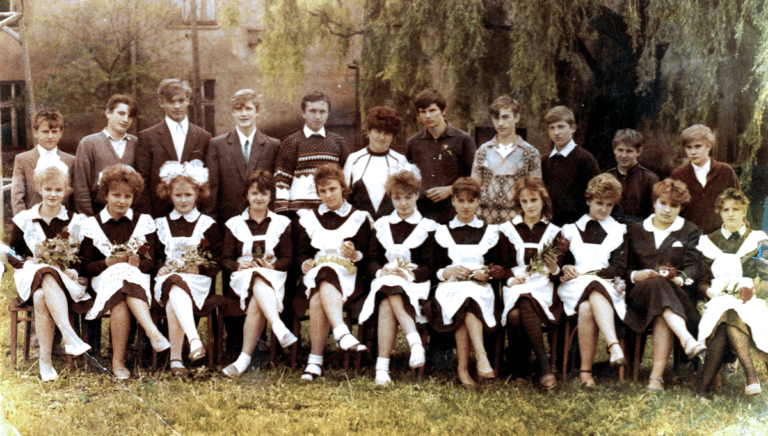Speaking practice with native speakers is in high demand among learners of English. One of the most common challenges that many intermediate-level English learners face is this:
So in today’s post, I will address these two challenges: finding those native speakers who would help you practice English and making it easier to communicate with them.
Finding Native Speakers
Finding native speakers is not that difficult. The entire North American continent is filled with them, not to mention Australia, Great Britain, and countries in Africa where English is the main official language.
The challenge is to find native speakers who would be willing to speak with you for free, right?
Time is precious, and only the native speakers who have a reason to converse with you will do so.
Usually, the reason is language exchange.
If they want to learn your native language (for example, Ukrainian), you’ll share the meeting time speaking partly in English and partly in Ukrainian.
Another reason could be cultural exchange or government programs for youth. Some people do it because they plan to become English teachers and need practice with learners. Others do it to chat up girls online, and a few might do it out of curiosity.
Resources to connect with native speakers
Here are some resources and platforms you can explore to find native speakers for language exchange:
- Tandem: This app allows you to connect with language learners and native speakers around the world. You can chat through text, voice, or video calls, helping you practice English while helping others with your language.
- HelloTalk: Similar to Tandem, HelloTalk lets you connect with native speakers through text, voice messages, and even corrections of your messages. It’s a great platform for immersive language practice.
- Speaky: Speaky provides a platform for language learners to practice speaking with native speakers. You can filter potential language partners based on your interests and availability.
- “Watch Your English” movie club. It is an online speaking club designed for English learners, offering a opportunity to practice and improve speaking skills through discussions inspired by movies in English. Participants engage in conversations, fostering confidence, vocabulary growth, and fluency while connecting with fellow language enthusiasts.
- Reddit: The subreddit r/language_exchange is a community where people look for language exchange partners. You can post your language learning goals and connect with native speakers there.
- Facebook Groups: Search for language exchange or language learning groups on Facebook. There are often groups dedicated to connecting learners and native speakers for language practice.
- English Conversation Club (public)
- The Language Nerds (public)
- Learn American English with Natives-USA Based (Language Exchange) – (private, you need to apply)
- Language Exchange (private)
- Meetup.com: Look for language exchange events or groups in your local area on Meetup. These events are often informal gatherings where people practice different languages.
- Language Learning Forums: Websites like LingQ, Polyglot Club, and WordReference have forums where you can find language exchange partners and engage in language-related discussions.
These resources can give you a good starting point to connect with native English speakers and enhance your language learning experience.
But you know what? In one of my older newsletters, I provided a list of these and similar resources for finding speaking partners among native speakers.
Do you know how many people used that list?
Only two.
The rest probably saved the list and soon forgot about it. Why? Because it’s intimidating to put yourself in front of a stranger and speak in a foreign language, especially if it’s not foreign to them.
Very few learners at the B1 level take this step because it requires a lot of courage and confidence in your English.
But what if you are still trying to build up that confidence?
To discuss that, let me first ask you another question:
How difficult is it for you to walk 11 km?
It’s achievable, right? You might even be able to walk farther. But how challenging would it be for a toddler to cover that distance?
Yes, a toddler can walk, but they’re unsteady on their legs. They get tired easily. They might fall along the way, scrape their knee, and start crying.
Even though they said they wanted to take that walk, it might not be a great idea, would it?
When you tell me that your level is “somewhere in the middle” and you want to find native speakers to speak with, I get that. Speaking fluently with native speakers is the ultimate goal of any language learner.
I get that. But I can’t help thinking about that toddler wanting to take an 11 km hike.

A toddler needs a safe environment to get stronger, steadier, and more confident. First, their parents’ living room, then the grass in their backyard, and ready hands to catch them if they are about to fall. Soon the kid starts walking independently and explores wherever they want.
I bet you don’t remember the time when you were learning to walk. The frustrations of falling. Getting up again and again.
It took time and lots of practice, but eventually, it became so easy you forgot about the challenges.
You need this time and a safe place for your English struggles as well.
You need a secure environment where you can practice your speaking skills without feeling overwhelmed. Without damaging your confidence when you stumble: forget a word, make a mistake, or don’t know what to say next.

Building your English fluency and confidence
You will speak with native speakers fluently.
But do you really need to start doing it right now? Should this goal be your main focus at the moment?
You’ve achieved a decent level already, right?
Your current goal is to improve your skills in a way that speaking fluently becomes inevitable.
So how do you start speaking like a native speaker?
You listen to how they speak in everyday conversations. You observe. You absorb the language. You try using that language but without pressure.
You can listen to informal conversations of native speakers by watching movies in English. You observe and learn the language from the movies by completing specific activities (like the ones in the movie workbooks). You practice your speaking skills by discussing those movies and activating new words and grammar during our movie discussions.
So ask yourself again: Why do you want to speak with native speakers?
Do you believe that only native speakers can provide you with interesting conversations? Or do you think that only native speakers have good English?
I follow at least a dozen experts whose native language is NOT English. But they use their excellent English on YouTube or their blogs to share their expertise and provide value to thousands of followers, fans, and clients, even among native speakers.
The point is, native speakers are not the only people you can practice your speaking skills with.
If their level is similar to yours or slightly higher, this community might be ideal for developing your fluency and boosting your speaking confidence.
One such opportunity to improve your speaking skills so that you sound natural is to join our Speaking Program. It allows you to practice speaking almost every day by recording your response to a question, send your voice message to me, and get feedback on how to make it sound more natural. You can then re-record your message – without mistakes and with better vocabulary. Next time, when you speak with native speakers about this topic, you’ll understand them better and will be able to express your thoughts more completely.
Once you’ve built your speaking confidence and improved fluency, speaking with native speakers will be less of a challenge.
3 simple steps to sound natural when talking about your travels




